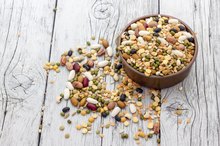What does fact checked mean?
At Healthfully, we strive to deliver objective content that is accurate and up-to-date. Our team periodically reviews articles in order to ensure content quality. The sources cited below consist of evidence from peer-reviewed journals, prominent medical organizations, academic associations, and government data.
- NIH Research Matters; Sodium-Potassium Ratio Linked to Cardiovascular Disease Risk; January 2009
- MedlinePlus: Heart Failure
The information contained on this site is for informational purposes only, and should not be used as a substitute for the advice of a professional health care provider. Please check with the appropriate physician regarding health questions and concerns. Although we strive to deliver accurate and up-to-date information, no guarantee to that effect is made.
What Beans Are Good for High Blood Pressure?
The National Institutes of Health estimate that one in three people have high blood pressure, or hypertension. High blood pressure happens when blood flows through your arteries at a much higher than normal pressure.
If high blood pressure is left untreated, it can lead to serious medical conditions such as kidney disease, heart disease, and stroke. Diet changes can be a way to prevent and treat high blood pressure. Eating beans is a great start to improving the diet.
Sodium/Potassium Balance
Your sodium-potassium ratio directly influences your blood pressure. A 2009 study published in the "Archives of Internal Medicine" concluded that rather than studying sodium and potassium separately in treatment of cardiovascular disease, perhaps the ratio of sodium and potassium may be more important 1.
Current research agrees. A 2016 study published in "Nutrients" found that people with higher sodium/potassium ratios - high sodium intake and low potassium intake - were at a greater risk for high blood pressure. Basically this means that you should be reducing the amount of sodium in the diet while eating more foods that contain potassium.
- Your sodium-potassium ratio directly influences your blood pressure.
- A 2016 study published in "Nutrients" found that people with higher sodium/potassium ratios - high sodium intake and low potassium intake - were at a greater risk for high blood pressure.
High-Potassium Beans
Nutritional Values for Dried Beans Vs. Canned Beans
Learn More
Cooked dry beans, peas and lentils can be good protection against high blood pressure due to their large potassium contributions to your diet.
Recommended Potassium and Sodium Intakes
Currently, Harvard Medical School estimates the average intake of sodium is 3,400mg and 2,500mg of potassium per day for a ratio of 1.36 to 1. For potassium to have a beneficial blunting effect on sodium-induced high blood pressure, you need to increase the amount of potassium from food sources, while decreasing the amount of sodium in the diet.
Track your intakes from beans and other food sources via the nutrition data on food labels.
Low-Sodium Sources
Foods High in Magnesium Chloride
Learn More
Potassium-rich beans are a healthy addition to any diet, but it hinges on salt reduction. Canned beans are often processed with added salt and deliver far more sodium than dry, minimally processed beans.
Compare the 660 milligrams of sodium in 1 cup of canned kidney beans to the 2 milligrams in kidney beans cooked at home from dry sources. Draining and rinsing canned beans can help remove some of the sodium. When fresh dry beans are not available, choose frozen beans without added salt and canned beans with reduced sodium.
- Potassium-rich beans are a healthy addition to any diet, but it hinges on salt reduction.
Health Significance
Your food choices can affect your longevity and quality of life. Achieving the correct sodium-potassium ratio can help you avoid some of the painful and potentially fatal complications associated with hypertension. Foods such as beans are a healthy way to get more potassium in the diet.
It is best to achieve a higher intake of potassium through foods, like beans. Always speak with a doctor before trying to boost your potassium intake through supplements, as excess potassium can interfere with certain medications or conditions.
- Your food choices can affect your longevity and quality of life.
- It is best to achieve a higher intake of potassium through foods, like beans.
Related Articles
References
- NIH Research Matters; Sodium-Potassium Ratio Linked to Cardiovascular Disease Risk; January 2009
- U.S. Department of Agriculture; Dietary Guidelines for Americans 2010; December 2010
- U.S. Department of Agriculture: National Nutrient Database for Standard Reference
- MedlinePlus: Heart Failure
- Linus Pauling Institute. Potassium.
- National Institute of Health. Office of Dietary Supplements. Potassium.
- Aburto, et. al. Effect of increased potassium intake on cardiovascular risk factors and disease: systematic review and meta-analyses. BMJ. 2013 Apr 3;346:f1378. DOI: 10.1136/bmj.f1378.
- Appel LJ, Moore TJ, Obarzanek E, et al. A clinical trial of the effects of dietary patterns on blood pressure. DASH Collaborative Research Group. N Engl J Med. 1997;336(16):1117-1124.
- Ferraro PM, et. al. Dietary Protein and Potassium, Diet–Dependent Net Acid Load, and Risk of Incident Kidney Stones. CJASN. October 2016, 11 (10) 1834-1844; DOI: 10.2215/CJN.01520216
- Granchi, D, et. al. Potassium Citrate Supplementation Decreases the Biochemical Markers of Bone Loss in a Group of Osteopenic Women: The Results of a Randomized, Double-Blind, Placebo-Controlled Pilot Study. Nutrients. 2018 Sep 12;10(9). pii: E1293. DOI: 10.3390/nu10091293.
- Linus Pauling Institute. Potassium.
- Macdonald, HM, et. al. Effect of potassium citrate supplementation or increased fruit and vegetable intake on bone metabolism in healthy postmenopausal women: a randomized controlled trial. Am J Clin Nutr. 2008 Aug;88(2):465-74.
- National Institute of Health. Office of Dietary Supplements. Potassium.
Writer Bio
Nancy Clarke began writing in 1988 after achieving her Bachelor of Arts in English and has edited books on medicine, diet, senior care and other health topics. Her related affiliations include work for the American Medical Association and Oregon Health Plan.









